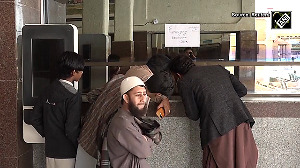The size of the banking software application market globally is estimated to be at about $75 billion in 2007. The market is growing at about 5 per cent a year.
Within this, the core banking replacement market is growing at a CAGR of 17 per cent, according to various analyst firms. The need for greater agility, faster innovation and lower total cost of ownership (TCO) is driving the global banking and financial houses to look at Indian solutions providers.
Global banks are always under pressure to meet the challenges faced by rapidly changing customer demands and competition.
"Indian solutions providers not only understand deeply the banking business in different countries, but also try to leverage such knowledge to come out with specific solutions to address the business needs of banking customers. As a result, the solutions are cross-pollinated from experiences around the world," says Sanjay Kumar, GM, BFSI Solutions, ITC Infotech.
For instance, i-flex solutions - the biggest player in the Indian banking software product market, says it is witnessing a strong demand for its solutions in all of Europe, North America and APAC region.
Driven by its Flexcube core banking and lending solutions - and Reveleus and Mantas that address the risk and compliance solutions market - the company which rides on its parent Oracle's market reach, currently caters to more than 765 customers in over 130 countries.
In the financial year ended March 31, 2007, i-flex reported 39 per cent of its revenues coming from the US, followed by 28 per cent from Europe and 14 per cent of India, the Middle East and the African region.
"We see a continued momentum across all lines of our businesses. It is especially strong in Western, Central & Eastern Europe, where we are witnessing consolidation and standardisation of banking operations across the EU and emerging BRIC economies (Brazil, Russia, India, China) which are all growing at over 8 per cent GDP growth rate," said N R K Raman, MD & CEO, i-flex solutions.
TCS Financial Solutions - a strategic business unit of TCS, which delivers products to the banking and financial sector under the brand name TCS BaNCS - too has a customer base of 214 spanning across 80 countries.
Leading banks like the Bank of Panhsin (Taiwan), Bank of China and Huaxia Bank (both in China) have implemented TCS BaNCS core banking solutions to drive growth, reduce costs, mitigate risk and offer a faster speed to market.
Finacle, the banking solutions arm of Infosys, has over 100 customers spread across 55 countries. Around 53 per cent of its customers are located in the Asia-Pacific (APAC) region, followed by 42 per cent in Europe, the Middle East and Africa (EMEA), and 5 per cent in the US.
Meanwhile, given the potential of the IT spend in the BFSI, many companies are coming out with newer models to sharpen their focus in the bankingsector. They are expanding their solution portfolio in areas of Islamic banking, management of global risks, compliance and asset and private wealth management.
Consider the case of ITC Infotech - traditionally a service provider to leading banks including Abbey National Bank (UK) and Danske Bank (Denmark) - which is getting into the solutions space. The company has already developed solutions around portfolio rationalisation and right sourcing, and is working on to introduce newer solutions to address different areas within BFSI, in the next 2-3 months.
Finacle is another example. "At this stage we see a significant amount of action across various banking sub-segments. The significant ones which are showing tremendous potential include retail banking, Islamic banking, payments, risk, regulatory compliance, treasury and wealth management," said Haragopal Mangipudi, vice president, Global Head, Finacle.
During the last two quarters (nine months), Finacle added nine new customers to its kitty of which five belong to the EMEA region, three from APAC and one from the US.
"Over the next few years, our expectation is that India will be a dominant source of contributing newer products and business techniques to the world banking environment," concludes Kumar.







 © 2025
© 2025